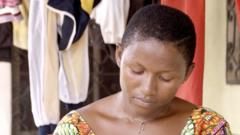In the troubled anglophone regions of Cameroon, the situation remains dire as civilians are caught in the violent crossfire between government troops and separatists. Four years after the brutal murder of her husband Johnson Mabia by armed separatists, Ngabi Dora Tue finds herself grappling with the trauma and economic desolation brought on by ongoing conflict. Once a civil servant, Johnson was kidnapped along with five colleagues, and despite pleas for ransom, he was tragically killed just days later, leaving his family to bear the weight of their loss.
What began as peaceful protests in 2016 against the imposition of a bilingual legal system escalated into a conflict marked by atrocities, deep divisions, and a fight for autonomy. The advances made by separatists, who declared an independent state named the Federal Republic of Ambazonia, have resulted in a profound humanitarian crisis, with at least 6,000 lives lost and over 700,000 people displaced. Eyewitness accounts describe daily life filled with fear—dead bodies on the streets, kidnappings, and relentless violence have become a part of life for many.
The government's approach to the uprising has been described as increasingly brutal, including the detention and torture of civilians erroneously accused of supporting separatists. Activists and organizations like Human Rights Watch report widespread human rights abuses committed by both state security forces and non-state actors, creating an atmosphere where trust is impossible. Reports of natural resources and institutions being weaponized amplify the fears among the population—half of the schools in the region are now closed due to the ongoing violence.
As the conflict remains unresolved, calls for dialogue from various stakeholders have yielded little substantial change. Although a government-initiated "national dialogue" in 2019 sought to address the grievances of the anglophone community, it fell short of delivering meaningful reforms. Leaders like barrister Felix Agbor Nkongho, who once advocated for the rights of the region, lament that both the separatists and government forces have compromised their moral integrity in the fight for power.
The situation is compounded by the emergence of militant groups within the separatist ranks who oppose the Ambazonian struggle, adding further confusion to the already dire dynamics. As individuals like John Ewome engage in counter-insurgency efforts, they too face accusations of human rights violations, perpetuating a cycle of violence and mistrust.
For families like Ngabi's, finding a way forward amidst crippling debt and uncertainty feels insurmountable. Many face the grim reality of survival, with some even contemplating drastic measures to provide for their children. The continuing violence raises critical questions about governance and the future of Cameroon, a country divided by linguistic and cultural identities—struggling to find harmony amid chaos.
While the Ambazonian Defense Forces assert that their actions are governed by international law and oppose violence against civilians, the families grieving their lost loved ones like Ngabi Dora Tue know all too well the personal and communal costs of this unresolved struggle. As the conflict rages on, the future for millions hangs in the balance, with questions of safety, identity, and hope left unaddressed.


















